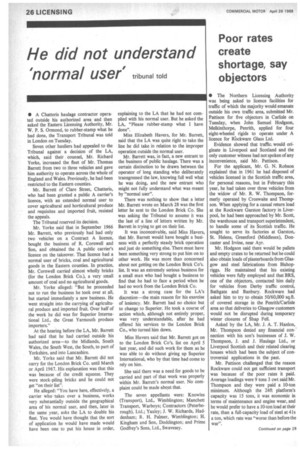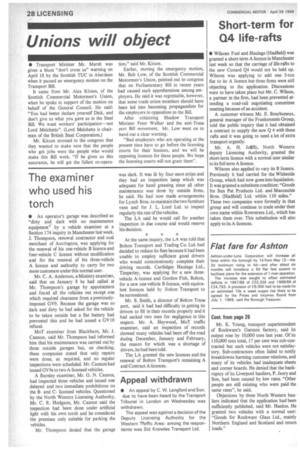Poor rates create shortage, say objectors
Page 28

Page 30

If you've noticed an error in this article please click here to report it so we can fix it.
• The Northern Licensing Authority was being asked to licence facilities for traffic of which the majority would emanate outside his own traffic area, submitted Mr. Pattison for five objectors in Carlisle on Tuesday, when John Samuel Hodgson, Melkinthorpe, Penrith, applied for four eight-wheeled rigids to operate under A licence for ROckware Glass Ltd.
Evidence showed that traffic, would originate in Liverpool and Scotland and the only customer witness had not spoken of any inconvenience, said Mr. Pattison.
For the applicant, Mr. G. N. Robson explained that in 1961 he had disposed of vehicles licensed in the Scottish traffic area, for personal reasons, but in February this year, he had taken over three vehicles from the widow of Mr. R. W. Thompson, formerly operated by Croswaite and Thompson. When applying for a casual return load at the Rockware Garston factory in Liverpool, he had been approached by Mr. Scott, the warehouse and transport superintendent, to handle some of its Scottish traffic. He sought to serve its factories at Garston, St. Helens, Greenford (Middlesex), Doncaster and Irvine, near Ayr.
Mr. Hodgson said there would be pallets and 'empty crates to be returned but he could also obtain loads of plasterboards from Glasgow and steel fabrications from Bishopriggs. He maintained that his existing vehicles were fully employed and that BRS, one of the objectors, contacted him daily for vehicles from Derby traffic control, Bathgate and Banbury. Rockware had asked him to try to obtain 50/60,000 sq.ft. of covered storage in the Perurith/Carlisle area so that deliveries to Glasgow customers would not be disrupted during temporary winter closures of Shap Fell.
Asked by the LA, Mr, J. A. T. Hanlon, Mr. Thompson denied any financial connection with his son's businesses of J. W. Thompson, J. and J. Haulage Ltd., or Liverpool Scottish and their related clearing houses which had been the subject of controversial applications in the past.
Mr. Pattison challenged that the reason Rockware could not get sufficient transport was because of the poor rates it paid. Average loadings were 9 tons 3 cwt said Mr. Thompson and they were paid a 10-ton minimum. Although the 24ft platform's capacity was 15 tons, it was economic in terms of maintenance and engine wear, and he would prefer to have a 10-ton load at their rate, than a full-capacity load of steel at 41s a ton, which rate was "worse than before the war". Mr. K. Young, transport superintendent of Rockware's Garston factory, said its output rose by 10,000 tons last year. Of its 110,000 tons total, 17 per cent was sub-contracted but such vehicles were not satisfactory. Sub-contractors often failed to notify breakdowns harming customer relations, and many of its vehicles had inadequate sheets and corner boards. He denied that the bankruptcy of its Liverpool hauliers, P. Jeory and Son, had been caused by low rates. "Other people are still existing who were paid the same rates", he said.
Objections by three North Western hauliers indicated that the application had been sufficiently published, said Mr. Hanlon. He granted two vehicles with a normal user: "Goods for Rockware Glass Ltd., mainly Northern England and Scotland and return loads."




















































































































